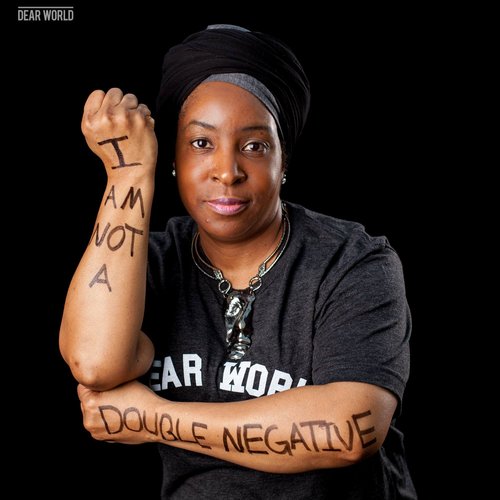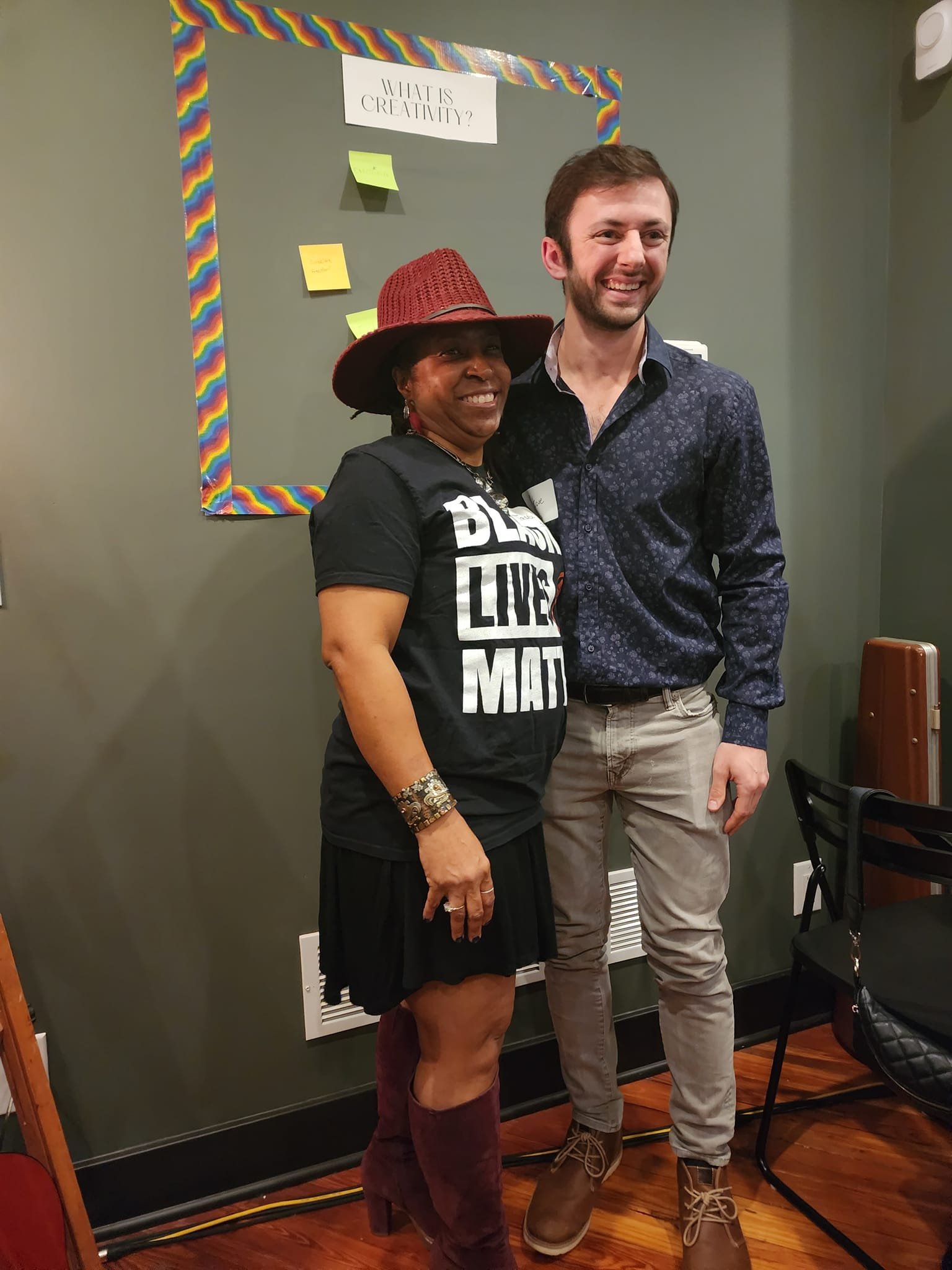An Artivist's Journey

Traci Williams is a 2015 Undergraduate Transfer Scholar and a 2022 Graduate Scholar, attending Morgan State University
From the young age of three, Traci D. Williams loved to read books and write her own stories. As a child, she always questioned the ways of the world, and tried her best to make sense of the inequities she witnessed and experienced. For her, activism has always been at the core of her art. “This has been with me since I could read and write. I would always ask why.”
Williams is currently a Language and Professional Writing doctoral student at Morgan State University pursuing a PhD with a specialty in Creative Writing and a focus on Multicultural and Gender Studies. Through word art, she promotes access and equity, addressing culturally responsive teaching, race and ethnic heritage, gender, religion, ability, linguistic diversity, sexual orientation, and any nameable identity.
As a storyteller and an activist, Williams creates and advocates in multiple mediums, most recently through opera as a librettist, which is a person who writes the text of an opera.
Williams’ first opportunity as a librettist came from fellow Cooke Alum Evan Kassof in 2019. Kassof, a 2012 Graduate Arts Scholar and current composer and organizer in Philadelphia, posted an opportunity for creative writers in a Cooke Scholars and Alum Facebook Group about an upcoming opera project he was leading.
What started as a simple, “I’m interested in learning more” message from Williams to Kassof, turned into Williams joining the Serial Opera Project as a librettist.
The Serial Opera Project was created by ENAensemble, a group of creatives committed to making operas, theater, cinema, music, cabaret, and art to tell stories. The opera project brought together different composers and librettists to create opera pieces centered around a theme. In 2019, Williams was selected to join as a librettist alongside composer Michael Shingo Crawford.
Her first piece, “Maximum Capacity” (1st libretto, 2018) was a part of ENAensemble’s 2019 Fringe Festival Show Between, and was a love story between two women and their experience embracing and experiencing love despite different awareness levels about their own sexual orientations. Williams incorporated important themes of housing insecurity, the Black Lives Matter movement, and intersectionality.
Her second piece, “Wailing at the Moon” (2nd libretto, 2022) was composed by Sepehr Pirasteh. “Wailing at the Moon” was a continuation of “Maximum Capacity” and told the story about the two women reconnecting after a tumultuous 2020.

Librettist Traci D. Williams and “Hamartia” Composer Steve Crino
Her latest piece, “Hamartia,” made its world premiere in November 2022, and was part of a project put on by the Creative Becoming community.
“Part of Creative Becoming’s vision is to authentically connect audiences and artists, as well as facilitate projects that are envisioned by the community members themselves,” said Elise Mark, lead organizer for the community. “[The Creative Collaborators Collective Performance] focused on creativity and collaboration, so once we gathered creatives who were interested in the project, we met to discuss and work together to create the show.”
Williams’ latest piece, “Hamartia” was performed by Elise Mark, who performs as a soprano in addition to her role as creative visionary behind the Creative Becoming project.
Written as a conversation between the self, Williams incorporated components of mental health, religion, and a theme that she describes as “destructive love.”
Williams worked with composer Steve Crino who wrote the music to her piece “Hamartia.” Trust was a huge aspect of the creative process; between phone calls and emails, both individuals worked together to ensure the piece stayed true to Williams’ vision. They trusted each other’s individual roles as composer and librettist.
As the third composer she’s worked with, Williams said that “[Crino] fully understood what I was trying to convey, and it came across in the music.”
The night of the performance, Williams’ piece received a standing ovation.
Prior to 2019, Williams primarily worked on the page, poems, short stories, and theatre writing. When she was approached with the opportunity to have her work woven into classical music, she wanted to make sure the finished product stayed true to herself.
“This is who I am, I’m an artist and an activist,” said Williams. “Are you here genuinely for me to lend my voice to this project? Or are you trying to pull me out as a token or a mockery?”
Since she’s never sure if she will be the only Black-identifying person when entering a predominately-White creative space, Williams always tries to protect her energy and safety, “There’s a part of me that has to figure out how to be safe instead of worrying about how they’re going to perceive me.”
Throughout her past three operatic experiences, Williams had overwhelmingly positive and safe experiences.
“Sometimes it’s hard to be the only one in a room, and you have to do all the work,” said Williams. “But I’m grateful that I haven’t been around people who make me be the voice for everybody who looks like me.”
For individuals who are seeking out creative opportunities within their communities where they may be the only person of color, Williams advises on embracing available opportunities while vetting organizations carefully.
“Look into organizations that are approaching you,” said Williams. “Take advantage of what you can take advantage of because you need those invites to get a seat at the table.”
For Williams, the invitation to participate in the latest opera project came with the backing and vouching of Kassof, who knew Elise Marks, the creative director, from their undergraduate careers at the University of Florida and from working in similar creative circles in Philadelphia. Kassof’s recommendation of the project was enough for Williams to join with excitement and faith that her work and voice would be respected.
“It’s one thing to be invited, it’s another thing to be welcomed,” said Williams. “[Evan Kassof] has done both.”
Journeying into the world of opera as an artivist has been a rewarding and exciting experience for Williams. Her piece “Wailing at the Moon” will officially debut on January 25, 2023 in Philadelphia, PA, after being rescheduled from September 2022. While looking forward to new opportunities, Williams expressed gratitude towards that first invitation to the Serial Opera Project back in 2019, and the joy she’s experienced hearing her work on stage and in print.
“The late Poet Gwendolyn Brooks once said, ‘I felt that I had to write. Even if I had never been published. I knew that I would go on writing, enjoying and experiencing the challenge,’” shared Williams. “This is the vein I operate in, and the fact that I’m seeing things published is a great thing.”
In 2017, Traci was named one of Massachusetts’ Best Emerging Poets. In 2020, her original play BOXES was published in Caffé Cino Issue 3. She looks forward to adding film to her portfolio. Traci lives in Baltimore, Maryland with her husband, three children, and seven grandchildren.
Learn more about ENAensemble here.